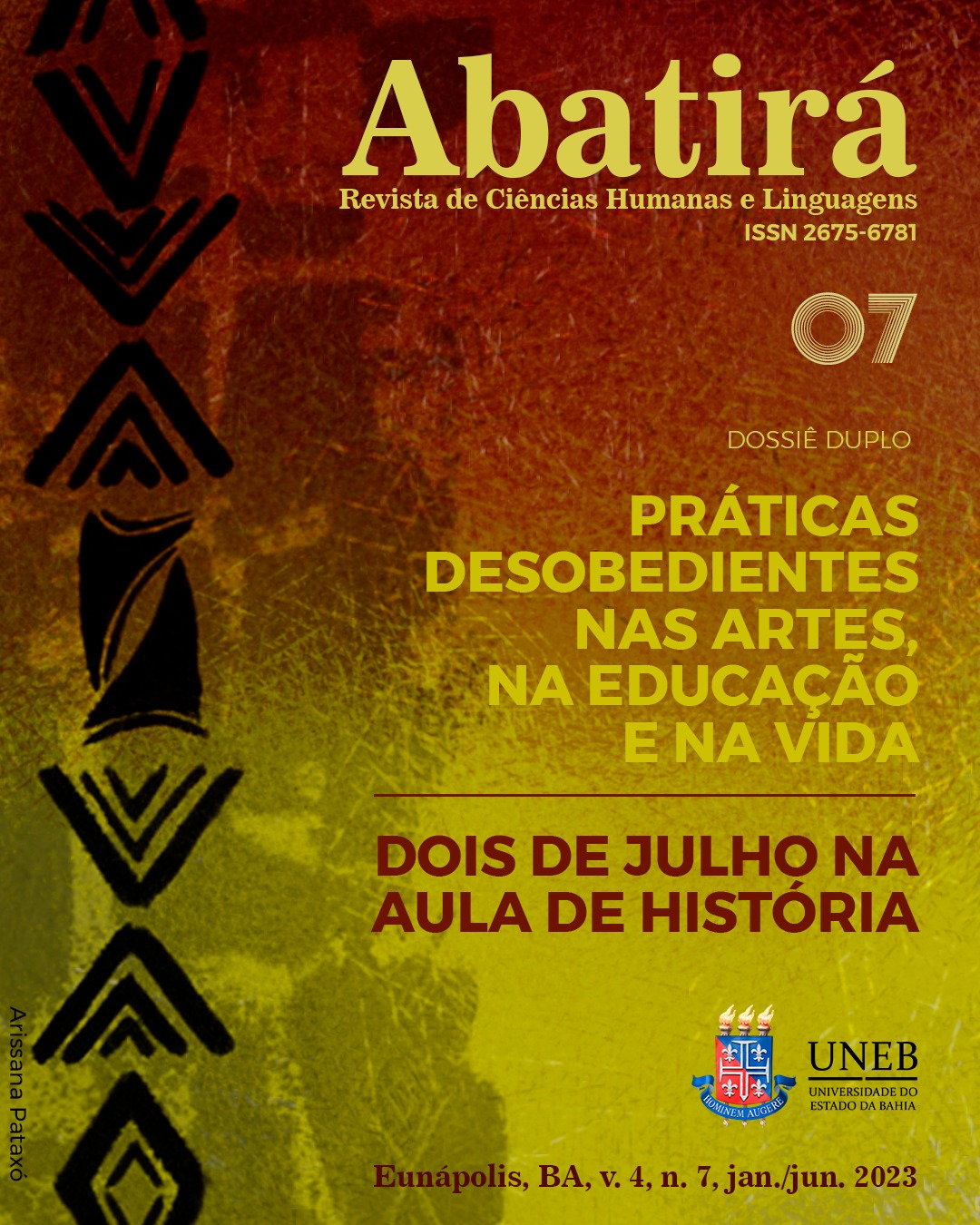The Black Panther Party
For a decolonial pedagogy in the English Language teaching
Keywords:
Ensino da Língua Inglesa, Decolonial, Partido dos Panteras NegrasAbstract
The current study reports the reflections and the experiences lived during The Black Panther Party Project. This project was developed at Colégio Estadual do Campo de Serra Grande, in the municipality of Uruçuca, from July to October 2020, during the COVID-19 pandemic period. The pandemic exacerbated social and racial inequality in the country fueled by the murder of George Floyd in the United States and the police violence which broke records in the same year and targeted mainly young black men. The impact of these events was followed by fierce demonstrations and a strong critique of racism. The consideration of these events in conjunction with students disengaged from the teaching-learning process has engendered a pedagogic proposal that would engage disparate students by addressing ethnic-racial relationship issues in dialogue with the English language. The possibilities of an insurgent, emancipatory and critical pedagogy would be realized by study of The Black Panther Party legacy, with the objective of deconstructing deeply rooted and entrenched Eurocentric epistemologies, revealed in the teaching-learning process of the English language. Studying, analyzing and recognizing the memory of resistance presented by this American movement would also provide relevant knowledge coordinated with the teaching of English language. Attentive and deliberate consideration of the BPP would demonstrate a black cultural self-determinative social movement, which arose from African American demands for a better quality of life, the reduction of economic inequality, the elimination of racial and police violence, and the struggle of this disadvantaged population to organize itself for social justice, as well as economic and political transformation. Thus, this work proposes to discuss the black body in opposition to racialized discourses; a body in which lays an alternative discourse; and, a body that, in the exhumation of memory, negates processes of silencing, resistance and revolts, which occupy the dominant historical narrative.
Downloads
References
ALMEIDA, Silvio Luiz de. Racismo estrutural. São Paulo: Pólen, 2019.
DOMINGUES, Petrônio. Movimento Negro Brasileiro: alguns apontamentos históricos. UCAM, vol. 12. Rio de Janeiro, 2007. Disponível em: https://www.scielo.br/j/tem/a/yCLBRQ5s6VTN6ngRXQy4Hqn/?format=pdf&lang=pt. Acesso em: 03 de janeiro de 2022
FANON, Frantz. Pele negra, máscaras brancas: Tradução de Renato da Silveira. Salvador: EDUFBA, 2008.
FREIRE, Paulo. À sombra desta mangueira. 11ª.ed. São Paulo: Paz e Terra, 2015.
GARRET, Linda. And At Once My Chains Were Loosed: How the Black Panther Party Freed Me from My Colonized Mind (2018). Dissertação. Doutorado. Doutorado em Educação. Universidade de São Francisco. São Francisco, Califórnia, Estados Unidos. Disponível em: https://repository.usfca.edu/diss/450 Acesso em: 30 de outubro de 2021.
GILROY, Paul. O Atlântico negro: Modernidade e dupla consciência. Tradução de Cid Kaipel Moreira. São Paulo: Ed. 34; Rio de Janeiro: Universidade Cândido Mendes, Centro de Estudos Afro-Asiáticos, 2001.
GIROUX, Henry, A. On Critical Pedagogy: The Continuum International Publishing Group, New York, NY, United States of America, 2011.
GOMES, Nilma Lino. Diversidade étnico-racial, inclusão e equidade na educação brasileira: desafios, políticas e práticas. Revista Brasileira de Política e Administração da Educação, vol. 27, n.1, p. 109-121, jan. /abr. 2011.
GOMES, Nilma Lino. O movimento negro educador: saberes construídos nas lutas por emancipação. Petrópolis, Rio de Janeiro: Vozes, 2018.
GONZALEZ, Lélia. Primavera para as rosas negras: Lélia Gonzalez em primeira pessoa. 1ª. ed. Diáspora Africana: Editora Filhos da África, 2018
QUIJANO, Aníbal. Colonialidad del poder y clasificación social. In: Castro-Gómez, Santiago e Grosfoguel, Ramón (Orgs) El giro decolonial: reflexiones para una diversidad epistémica más allá del capitalismo. Bogotá: Siglo del Hombre Editores.2007, p. 9 – 22.
SPENCER, Robyn C. The revolution has come: Black Power, gender, and the Black Panther Party in Oakland. Duke University Press, United States of America, 2016.
Downloads
Published
How to Cite
Issue
Section
License
Copyright (c) 2023 Nilson Carlos Nascimento dos Santos, Elis Cristina Fiamengue

This work is licensed under a Creative Commons Attribution 4.0 International License.

Este trabalho está licenciado sob uma licença Creative Commons Attribution 4.0 International License.Você é livre para:
Compartilhar - copia e redistribui o material em qualquer meio ou formato; Adapte - remixe, transforme e construa a partir do material para qualquer propósito, mesmo comercialmente. Esta licença é aceitável para Obras Culturais Livres. O licenciante não pode revogar essas liberdades, desde que você siga os termos da licença.
Sob os seguintes termos:
Atribuição - você deve dar o crédito apropriado, fornecer um link para a licença e indicar se alguma alteração foi feita. Você pode fazer isso de qualquer maneira razoável, mas não de uma forma que sugira que você ou seu uso seja aprovado pelo licenciante.
Não há restrições adicionais - Você não pode aplicar termos legais ou medidas tecnológicas que restrinjam legalmente outros para fazer qualquer uso permitido pela licença.





